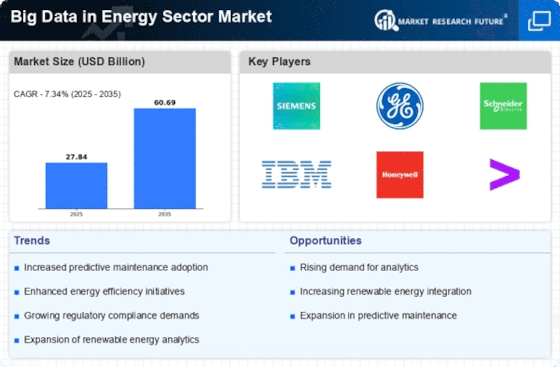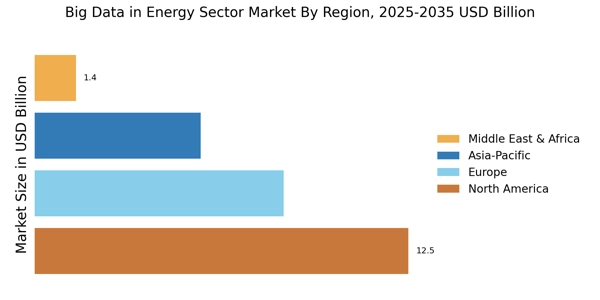Enhanced Operational Efficiency
The Big Data in Energy Sector Industry Market is increasingly driven by the need for enhanced operational efficiency. Energy companies are leveraging big data analytics to optimize their operations, reduce costs, and improve service delivery. By analyzing vast amounts of data from various sources, including smart meters and IoT devices, companies can identify inefficiencies and implement corrective measures. For instance, predictive maintenance powered by big data can reduce downtime and maintenance costs by up to 30%. This trend is expected to continue, as organizations seek to streamline processes and maximize resource utilization, thereby enhancing their competitive edge in the Big Data in Energy Sector Industry Market.
Growing Demand for Renewable Energy
The transition towards renewable energy sources is a significant driver in the Big Data in Energy Sector Industry Market. As countries commit to reducing carbon emissions, the integration of renewable energy sources such as wind and solar is becoming increasingly prevalent. Big data analytics plays a crucial role in managing the variability and intermittency associated with these energy sources. By analyzing weather patterns and energy consumption data, companies can optimize energy production and distribution. The market for renewable energy is projected to grow substantially, with investments expected to reach trillions of dollars by 2030. This shift necessitates advanced big data solutions to ensure efficient integration into the existing energy infrastructure.
Consumer Demand for Energy Efficiency
Consumer demand for energy efficiency is reshaping the Big Data in Energy Sector Industry Market. As awareness of environmental issues grows, consumers are increasingly seeking ways to reduce their energy consumption. Big data analytics enables energy providers to offer personalized solutions and insights to consumers, helping them make informed decisions about their energy use. For instance, smart home technologies that utilize big data can lead to energy savings of up to 20%. This trend is likely to drive the development of innovative products and services aimed at enhancing energy efficiency, thereby creating new opportunities within the Big Data in Energy Sector Industry Market.
Regulatory Compliance and Risk Management
Regulatory compliance is a critical driver in the Big Data in Energy Sector Industry Market. Energy companies are required to adhere to stringent regulations regarding emissions, safety, and operational standards. Big data analytics facilitates compliance by enabling real-time monitoring and reporting of key performance indicators. Furthermore, advanced analytics can help identify potential risks and mitigate them proactively. For example, companies utilizing big data for risk assessment can reduce incidents by up to 25%, thereby ensuring compliance and enhancing safety. As regulations evolve, the demand for big data solutions that support compliance and risk management is likely to grow in the energy sector.
Advancements in Technology and Infrastructure
Technological advancements are a pivotal driver in the Big Data in Energy Sector Industry Market. The proliferation of IoT devices, smart grids, and advanced analytics tools has transformed how energy companies operate. These technologies facilitate the collection and analysis of vast amounts of data, enabling better decision-making and operational improvements. For example, the implementation of smart grids can enhance energy distribution efficiency by up to 40%. As technology continues to evolve, energy companies are likely to invest heavily in big data solutions to harness these advancements, thereby driving growth in the Big Data in Energy Sector Industry Market.

















